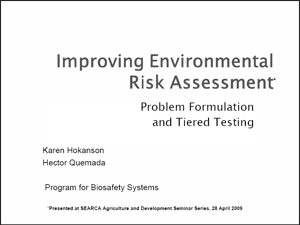Laguna, The Philippines
May 4, 2009
Source:
SEAMEO SEARCA
 The
development of regulatory dossiers in the process of risk
assessment of biotech crops aims to avoid unnecessary cost and
delay, and must improve and provide guidance in decision making
of the regulators. However, prior to risk characterization and
risk evaluation, the most essential step in any risk assessment
process is the problem formulation. This was shared by Drs.
Hector Quemada and Karen Hokanson of the Risk Assessment
Research and Biotechnology and Biodiversity Interface (BBI)
Component of the Program for Biosafety Systems during the
Seminar on Improving Environmental Risk Assessment, Problem
Formulation and Tiered Testing held last April 28 at the
Southeast Asian Regional Center for Graduate Study and Research
in Agriculture (SEARCA) based at University of the Philippines
Los Baños. The
development of regulatory dossiers in the process of risk
assessment of biotech crops aims to avoid unnecessary cost and
delay, and must improve and provide guidance in decision making
of the regulators. However, prior to risk characterization and
risk evaluation, the most essential step in any risk assessment
process is the problem formulation. This was shared by Drs.
Hector Quemada and Karen Hokanson of the Risk Assessment
Research and Biotechnology and Biodiversity Interface (BBI)
Component of the Program for Biosafety Systems during the
Seminar on Improving Environmental Risk Assessment, Problem
Formulation and Tiered Testing held last April 28 at the
Southeast Asian Regional Center for Graduate Study and Research
in Agriculture (SEARCA) based at University of the Philippines
Los Baños.
Identification of adverse effects or problem formulation is an
important initial step in rigorous risk assessment as it allows
for discerning the need-to-know from the nice-to-know biosafety
concerns thus narrowing down the risk hypotheses that need to be
addressed. A well-designed and implemented process for problem
formulation will improve the quality, consistency, clarity and
transparency of environmental risk assessment. The use of tiered
approaches for testing relevant risk hypotheses were also
highlighted during the seminar. The established methodologies
and science-based risk assessment allows for the wider adoption
and use of GM crops.
The seminar which was attended by professors, scientists,
regulators and research managers was organized by SEARCA, SEARCA
Biotechnology Information Center and the Program for Biosafety
Systems.
The PDF copy of the presentation can be downloaded at
http://www.bic.searca.org/seminar_proceedings/index.html.
For more information, please contact:
Ms. Jenny A. Panopio
Special Project Coordinator & Network Administrator
Biotechnology Information Center
SEAMEO SEARCA
College, Laguna 4031
Email: jap at agri.searca.org
Tel: (63-49)536-2290 loc 169 or 406
Tele/Fax: (63-49)536-4105
URL: www.bic.searca.org
|
|